Martin Edwards's Blog, page 195
September 3, 2014
Red Rock West - film review
I first watched Red Rock West not too long after its release in 1992,and was impressed. On a second viewing, twenty years later, the film stands up very well. It's a snappy neo-noir thriller, atmospherically filmed in Arizona, and with moments of dark comedy leavening the violence. The real surprise is that the movie did not do especially well at first, but its reputation has steadily increased, and with good reason.
Nicholas Cage is very good as Michael, a war veteran who is drifting around in his car, looking for work without much success. He's soon established as a genuinely decent guy, who does not readily give in to temptation. However, when he arrives in Red Rock, he makes his way to Wayne's Bar, and is mistaken by Wayne for Lyle, a hitman from Dallas whom he has hired to murder his wife.
Wayne is a superficially charming but in fact deeply odious character, very well played by J. T. Walsh, whose early death only six years after this film was made was a great loss.Michael reveals the plan to Wayne's wife, and does his best to escape from Red Rock, but Fate lends a hand. When he acts as a sort of Good Samaritan, he finishes up falling foul of the local cops. Then the Sheriff of Red Rock arrives -and this turns out to be Wayne.
The plot complications come thick and fast as Lyle finally arrives in town. He's played by the splendidly menacing Dennis Hopper, one of a number of very strong performances. Best of all is Cage, who shows what a good actor he is at his best. Red Rock West is a thoroughly enjoyable film, well worth a second viewing.
Nicholas Cage is very good as Michael, a war veteran who is drifting around in his car, looking for work without much success. He's soon established as a genuinely decent guy, who does not readily give in to temptation. However, when he arrives in Red Rock, he makes his way to Wayne's Bar, and is mistaken by Wayne for Lyle, a hitman from Dallas whom he has hired to murder his wife.
Wayne is a superficially charming but in fact deeply odious character, very well played by J. T. Walsh, whose early death only six years after this film was made was a great loss.Michael reveals the plan to Wayne's wife, and does his best to escape from Red Rock, but Fate lends a hand. When he acts as a sort of Good Samaritan, he finishes up falling foul of the local cops. Then the Sheriff of Red Rock arrives -and this turns out to be Wayne.
The plot complications come thick and fast as Lyle finally arrives in town. He's played by the splendidly menacing Dennis Hopper, one of a number of very strong performances. Best of all is Cage, who shows what a good actor he is at his best. Red Rock West is a thoroughly enjoyable film, well worth a second viewing.
Published on September 03, 2014 04:25
September 1, 2014
Shakespeare and Company, and Paris
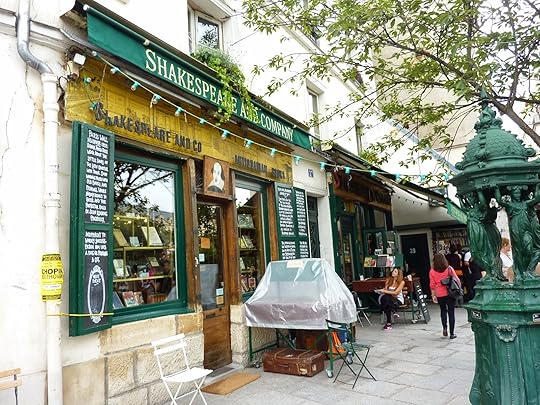

A well-read friend who knows my love of second-hand bookshops urged me some time ago to visit Shakespeare and Company, on Paris's Left Bank. During a short trip to the French capital, I found the shop, and discovered for myself that her praise for the place was well merited. It's hugely idiosyncratic, with places to sit and read from the substantial stock of books, not all of which are second-hand. Bags of atmosphere, and only a stone's throw from Notre Dame. It's immediately joined my list of favourite bookshops. and I'm really grateful for that recommendation.
This was my first visit to Paris for about thirty years; the occasion was a trip with my webmaster before he starts working life as a barrister. Since he'll be working in Lincoln's Inn, I felt it was about time to introduce
him to the work of Sarah Caudwell, and we each read a book of hers. Sadly, there are only four of those very funny, very clever stories - Sarah was far from prolific. There's an article about her on my website, but suffice to say that she was one of the more memorable writers I've met. I'll be featuring her work on this blog before long.




We tackled the obligatory sites, as well as some less well-known places. I climbed up to the second floor of the Eiffel Tower rather less quickly than I did all those years ago, and enjoyed my first cruise on the Seine. Notre Dame and Sacre Coeur were magnificent, of course, and so were a number of smaller churches, as well as several city parks and the Arc de Triomphe. Having explored the Louvre in the past, I very much enjoyed my first visit to the Musee d'Orsay, with (among much else) a fantastic collection of Impressionist paintings.


The French have a long tradition of detective fiction, though I've read French crime novels only sporadically. Years ago, I tried Maurice Leblanc, creator of Arsene Lupin, and was slightly underwhelmed, but I did like Gaston Leroux's The Mystery of the Yellow Room.. I enjoy Catherine Arley and one or two other suspense writers of the post-war period, but my favourite French crime writers are that gifted pair of magicians, Boileau and Narcejac. I still can't understand why so few of their books have been translated into English. As for one of today's superstars, Pierre Lemaitre, I thought Alex was very good, though I wasn't sure that some of the graphically described violence was absolutely necessary.



And, of course, what about Maigret? It's a very long time since I read any Simenon, but this trip has reminded me about a few Maigret stories in my library which I haven't got round to reading. Maybe it's time to give them a go.
Published on September 01, 2014 03:30
August 29, 2014
Forgotten Book - Angel in the Case
Milward Kennedy is a Golden Age author whose books I've covered several times on this blog, because I'm intrigued by his work. I'm a great admirer of Anthony Berkeley, as was Kennedy, and Kennedy tried to emulate his friend's innovative approach to the writing of crime fiction. But if Berkeley was uneven - and he was - then Kennedy was very, very uneven. And although he wrote some excellent books, I'm afraid that he also wrote some that were extremely disappointing - I'm a huge fan of the Golden Age, of course, but there's no point in pretending that even the best writers of that era always made best use of their gifts..
Kennedy wrote a couple of novels in the Thirties under a different pen-name, Evelyn Elder (his second wife was called Evelyn and I'd speculate that there was an age difference between them, hence the pseudonym). The first, Murder in Black and White, has been republished in recent times by Ramble House, although I did find it disappointing. The second is Angel in the Case, and that's a very rare title indeed. I've been hunting it for ages, and now a kind person has made a copy available to me, so this is my choice for today's Forgotten Book.
Let me start with the good news. The book is furnished with wonderful maps of the scene of the crime - they are just about the most appealing of any that I've ever seen in a Golden Age novel, detailed and attractive. Now for the bad news. To my mind, the story is dire. The writing is perfectly good, but the story did not hold any appeal for me at all.
The book begins with a police investigation into the drowning of a wealthy man called Curtis. He is a publisher, and the guests (and suspects) at his country house include a poet and a couple of writers. Scope here, I thought, for Kennedy to provide us with some entertainment, but apart from a passing nod to the Detection Club oath, the material is flat and uninteresting from start to finish. The eponymous Angel is an attractive female house guest, but I found her no more engaging than the rest of the cast. The mystery was desperately dull even before an American gangster was introduced (invariably a Bad Sign in a British Golden Age whodunit) with no attempt at characterisation, and precious little humour. Kennedy could do much better than this, fortunately. It''s a real shame about Angel in the Case, but I can only say that I wish that Kennedy had devoted more time to elaborating the story in an appealing way rather than concentrating on the maps.
Kennedy wrote a couple of novels in the Thirties under a different pen-name, Evelyn Elder (his second wife was called Evelyn and I'd speculate that there was an age difference between them, hence the pseudonym). The first, Murder in Black and White, has been republished in recent times by Ramble House, although I did find it disappointing. The second is Angel in the Case, and that's a very rare title indeed. I've been hunting it for ages, and now a kind person has made a copy available to me, so this is my choice for today's Forgotten Book.
Let me start with the good news. The book is furnished with wonderful maps of the scene of the crime - they are just about the most appealing of any that I've ever seen in a Golden Age novel, detailed and attractive. Now for the bad news. To my mind, the story is dire. The writing is perfectly good, but the story did not hold any appeal for me at all.
The book begins with a police investigation into the drowning of a wealthy man called Curtis. He is a publisher, and the guests (and suspects) at his country house include a poet and a couple of writers. Scope here, I thought, for Kennedy to provide us with some entertainment, but apart from a passing nod to the Detection Club oath, the material is flat and uninteresting from start to finish. The eponymous Angel is an attractive female house guest, but I found her no more engaging than the rest of the cast. The mystery was desperately dull even before an American gangster was introduced (invariably a Bad Sign in a British Golden Age whodunit) with no attempt at characterisation, and precious little humour. Kennedy could do much better than this, fortunately. It''s a real shame about Angel in the Case, but I can only say that I wish that Kennedy had devoted more time to elaborating the story in an appealing way rather than concentrating on the maps.
Published on August 29, 2014 06:00
August 27, 2014
Compulsion (2013) - film review
The 2013 Canadian film Compulsion is a re-make, but it has nothing to do with Meyer Levin's famous book of the same name, based on a true crime. Instead, it's a re-make of a South Korean movie called 301,302. I can see why the producers didn't want to use that title, but I have to say this film doesn't make me yearn to see the original. It's an odd piece of work.
I started watching without knowing anything about it other than that it starred Heather Graham and was a thriller. Heather Graham is fine, but I feel I was mis-sold with regard to the 'thriller' description. Compulsion doesn't seem to know what sort of a film it is trying to be. The thrills are few and far between, but there are some moments of sharp comedy and satire, and a few sexy scenes. There are as well one or two dark scenes about the abuse of a young girl which contrast with the very bright photography used in most of the film - these made me feel that the funny segments were lapses in tone.
We are introduced to Graham's character as someone fascinated by cooking, and it's clear at once that she's a little weird. A detective(Joe Mantegna) calls at her flat, and asks questions about a missing female neighbour. Little by little, the truth about the two women's relationship emerges. The neighbour, Saffron (Carrie-Anne Moss) was once a young film star, but is now writing sex advice columns while trying unsuccessfully to revive her acting career. When Graham discovers that her rich boyfriend is having an affair, she finds solace in cooking for Saffron, even though Saffron isn't keen to eat the food she is given.
The film runs for less than an hour and a half. Brevity is usually a plus point in books and movies, in my opinion, and I was glad that Compulsion didn't outstay its welcome. I've read some brutal reviews of it, as well as a few fairly good ones (though I think there's more admiration for the glamorous Graham than the storyline). In fairness, it's a film with some genuinely interesting component parts, but they are thrown together too randomly for Compulsion to rank as anything more than a curiosity.
I started watching without knowing anything about it other than that it starred Heather Graham and was a thriller. Heather Graham is fine, but I feel I was mis-sold with regard to the 'thriller' description. Compulsion doesn't seem to know what sort of a film it is trying to be. The thrills are few and far between, but there are some moments of sharp comedy and satire, and a few sexy scenes. There are as well one or two dark scenes about the abuse of a young girl which contrast with the very bright photography used in most of the film - these made me feel that the funny segments were lapses in tone.
We are introduced to Graham's character as someone fascinated by cooking, and it's clear at once that she's a little weird. A detective(Joe Mantegna) calls at her flat, and asks questions about a missing female neighbour. Little by little, the truth about the two women's relationship emerges. The neighbour, Saffron (Carrie-Anne Moss) was once a young film star, but is now writing sex advice columns while trying unsuccessfully to revive her acting career. When Graham discovers that her rich boyfriend is having an affair, she finds solace in cooking for Saffron, even though Saffron isn't keen to eat the food she is given.
The film runs for less than an hour and a half. Brevity is usually a plus point in books and movies, in my opinion, and I was glad that Compulsion didn't outstay its welcome. I've read some brutal reviews of it, as well as a few fairly good ones (though I think there's more admiration for the glamorous Graham than the storyline). In fairness, it's a film with some genuinely interesting component parts, but they are thrown together too randomly for Compulsion to rank as anything more than a curiosity.
Published on August 27, 2014 10:50
August 25, 2014
Cold Comes the Night - film review
Cold Comes the Night is a 2013 film directed, and co-written, by Tze Chun. The reviews I've seen have been rather mixed, and I find this rather hard to understand, since in my opinion this is a gripping thriller, and the audience never quite knows for sure where the meandering, but intriguing, storyline will lead. I felt that there were some original features to the story that were pretty impressive.
One of the attractive features of the film is that it has a heroine who sometimes behaves in a way that we simply do not associate with heroines. Alice Eve (yes, daughter of Trevor Eve, the one-time star of Shoestring) plays Chloe a single mother who runs a disreputable motel in a down-at-heel area. She is having an affair with a crooked police officer and is trying to make enough money to be able to take her young daughter somewhere safer and more appealing.
Topo, a gangster from Eastern Europe, played by Bryan Cranston, crosses her path with disastrous consequences. He has been hired to take some money to a villainous young crook, but when his driver is killed after a row with a prostitute at Chloe's motel, Topo loses the cash and has to threaten Chloe into helping him to retrieve it. His problem is that he is nearly blind, and this means that he needs her as much as she needs a share of that missing money.. A strange, yet oddly plausible, relationship develops between Chloe and Topo, and this adds a layer of complexity and interest to the film.
I really liked the way that, at times, the script made me root for Chloe and Topo as they embark on their hazardous quest, whilst not shrinking from the reality that each of them has a dark side. This is clever writing. From start to finish, I really wanted to know what happened next. This is a really entertaining movie, and I feel that it is undeservedly under-estimated.
One of the attractive features of the film is that it has a heroine who sometimes behaves in a way that we simply do not associate with heroines. Alice Eve (yes, daughter of Trevor Eve, the one-time star of Shoestring) plays Chloe a single mother who runs a disreputable motel in a down-at-heel area. She is having an affair with a crooked police officer and is trying to make enough money to be able to take her young daughter somewhere safer and more appealing.
Topo, a gangster from Eastern Europe, played by Bryan Cranston, crosses her path with disastrous consequences. He has been hired to take some money to a villainous young crook, but when his driver is killed after a row with a prostitute at Chloe's motel, Topo loses the cash and has to threaten Chloe into helping him to retrieve it. His problem is that he is nearly blind, and this means that he needs her as much as she needs a share of that missing money.. A strange, yet oddly plausible, relationship develops between Chloe and Topo, and this adds a layer of complexity and interest to the film.
I really liked the way that, at times, the script made me root for Chloe and Topo as they embark on their hazardous quest, whilst not shrinking from the reality that each of them has a dark side. This is clever writing. From start to finish, I really wanted to know what happened next. This is a really entertaining movie, and I feel that it is undeservedly under-estimated.
Published on August 25, 2014 01:30
August 22, 2014
Forgotten Book - Last Will and Testament
Today's Forgotten Book dates from 1936, but it has not been entirely neglected since its original publication. Last Will and Testament, by G.D.H. and Margaret Cole was exhumed from the vaults by Collins Crime Club in 1985, and that edition is my copy. It benefits from an excellent intro by Harry Keating, displaying his characteristic blend of kindliness and insight. Any crime critic looking to model himself or herself on a distinguished figure from the past would do well to look at how Harry did it. He was rarely harsh, but he never pretended that mundane books were brilliant either. A touch of graciousness is a very Good Thing in a critic or commentator, and Harry was naturally gracious. And his style was invariable agreeable and informative.
This book is evidently the follow-up to an earlier Coles effort, which I have not read, Dr Tancred Begins.(After reading this book, I recalled that Malcolm J. Turnbull, another excellent critic and an expert on Anthony Berkeley, wrote an interesting article about both stories in CADS a few issues ago.) They go to some pains to make clear that it is not necessary to have read the earlier book to enjoy this one, but it forms a companion piece. We are given to understand that the action of the first book took place 25 years earlier, and the gifted private detective was unable to pin guilt of murder on the presumed culprit. But now murder occurs again in the same family, and the original culprit is back in the frame.
I thought this was an exceptionally interesting premise for a book, and indeed for a pair of books. Dr Ben Tancred is, as Harry rightly says, a more engaging detective than Superintendent Wilson, whom the Coles usually favoured, and who does have a bit part to play in the two Tancred stories. Tancred also has his own "Watson", though I must say I struggled to understand why the Coles bothered to have a story narrated by someone who is not present during almost all of the action.
This story boasts various classic elements, including a country house and a seemingly unbreakable alibi. The alibi proved, however, to be all too easily shattered, and this was just one of the elements of the criminal's design that perplexed me. Another oddity was that two highly intelligent authors created a character who has been mauled by a tiger in...Africa. The story does have some charm, but on the whole, its weaknesses overwhelm it, and that clever premise is largely wasted.. I'm afraid that Harry showed greater skill at writing a positive introduction to the reissue than the Coles did at creating a fascinating mystery. They could do better than this. Despite Malcolm J. Turnbull's able advocacy, I doubt that I will bother with Dr Tancred Begins.
This book is evidently the follow-up to an earlier Coles effort, which I have not read, Dr Tancred Begins.(After reading this book, I recalled that Malcolm J. Turnbull, another excellent critic and an expert on Anthony Berkeley, wrote an interesting article about both stories in CADS a few issues ago.) They go to some pains to make clear that it is not necessary to have read the earlier book to enjoy this one, but it forms a companion piece. We are given to understand that the action of the first book took place 25 years earlier, and the gifted private detective was unable to pin guilt of murder on the presumed culprit. But now murder occurs again in the same family, and the original culprit is back in the frame.
I thought this was an exceptionally interesting premise for a book, and indeed for a pair of books. Dr Ben Tancred is, as Harry rightly says, a more engaging detective than Superintendent Wilson, whom the Coles usually favoured, and who does have a bit part to play in the two Tancred stories. Tancred also has his own "Watson", though I must say I struggled to understand why the Coles bothered to have a story narrated by someone who is not present during almost all of the action.
This story boasts various classic elements, including a country house and a seemingly unbreakable alibi. The alibi proved, however, to be all too easily shattered, and this was just one of the elements of the criminal's design that perplexed me. Another oddity was that two highly intelligent authors created a character who has been mauled by a tiger in...Africa. The story does have some charm, but on the whole, its weaknesses overwhelm it, and that clever premise is largely wasted.. I'm afraid that Harry showed greater skill at writing a positive introduction to the reissue than the Coles did at creating a fascinating mystery. They could do better than this. Despite Malcolm J. Turnbull's able advocacy, I doubt that I will bother with Dr Tancred Begins.
Published on August 22, 2014 02:00
August 20, 2014
"I Hear of Sherlock Everywhere...."
My enthusiasm for Sherlock Holmes dates back to when I was very young and first encountered the great man in the shape of Douglas Wilmer, on TV, and Basil Rathbone, on film. Strangely enough, though, this past twelve months has seen me involved in more Sherlock-related activity than ever before. I'm absolutely delighted by response to The New Mysteries of Sherlock Holmes,from readers. In addition, I've enjoyed writing an essay about Conan Doyle's short stories, giving an after dinner speech to the Sherlock Holmes Soceity, and starting work on a story about Professor Moriarty for a forthcoming anthology.
I've also written an introduction for a new collection of the 'best' Sherlock stories for Arcturus. It includes a wide selection from the short stories, together with The Hound of the Baskervilles. The book is beautifully presented in a slipcase and will be available later this year. I've just received my copy, and it looks very good on the shelf.
Now, I've been told of a good cause that has a Sherlockian theme. I don't often mention charity events on this blog, but I want to make a special exception today, given that research into brain-related conditions is so very important. I have (and had) too many friends who have suffered from these conditions over the years. And the event really does sound like fun, as this extract from the press release suggests
"Sherlock fever has gripped Yorkshire as a charity’s campaign to break the World Record for the most people dressed as Sherlock Holmes has gone viral.
Sherlock Holmes, one of the most popular consulting detectives of all time, is on the case to help raise money for the Yorkshire Brain Research Centre at the Leeds Teaching Hospitals.
The Guinness World Record attempt promises to host the biggest Sherlock party ever. It takes place on 31st August 2014 in Temple Newsam, Leeds from 12 noon. Entry fee is £15 and every participant will receive a Deerstalker hat, pipe and magnifying glass.
The event features a big stage featuring comedy, music, dance and theatre. There will be food, fun rides and and a few surprises along the way."
I've also written an introduction for a new collection of the 'best' Sherlock stories for Arcturus. It includes a wide selection from the short stories, together with The Hound of the Baskervilles. The book is beautifully presented in a slipcase and will be available later this year. I've just received my copy, and it looks very good on the shelf.
Now, I've been told of a good cause that has a Sherlockian theme. I don't often mention charity events on this blog, but I want to make a special exception today, given that research into brain-related conditions is so very important. I have (and had) too many friends who have suffered from these conditions over the years. And the event really does sound like fun, as this extract from the press release suggests
"Sherlock fever has gripped Yorkshire as a charity’s campaign to break the World Record for the most people dressed as Sherlock Holmes has gone viral.
Sherlock Holmes, one of the most popular consulting detectives of all time, is on the case to help raise money for the Yorkshire Brain Research Centre at the Leeds Teaching Hospitals.
The Guinness World Record attempt promises to host the biggest Sherlock party ever. It takes place on 31st August 2014 in Temple Newsam, Leeds from 12 noon. Entry fee is £15 and every participant will receive a Deerstalker hat, pipe and magnifying glass.
The event features a big stage featuring comedy, music, dance and theatre. There will be food, fun rides and and a few surprises along the way."
Published on August 20, 2014 01:30
August 19, 2014
Brian Innes - R.I.P.
Despite all the pleasures of the St Hilda's Crime and Mystery week-end, there was one sad moment, when the news was broken to me that Brian Innes has died. This happened last month, but somehow I'd missed hearing about it. Brian had a number of claims to fame. Among them was this - he was the only person I knew who once had a number one hit record.
As this obituary explains, Brian was a prominent member of the Temperance Seven, a group I remember very distantly from my childhood. At one time they were often on television, thought their hey-day came immediately before the Beatles changed everything in popular music. Their big hit was "You're Driving Me Crazy", although I'm not quite old enough to remember it topping the charts.
I came to knew Brian because he was a regular at CWA conferences, and entertaining company he was, too. I was startled to read in the obituary that he was 86, because he seemed younger than his years. There was always a twinkle in his eye. He was very loyal to the CWA, and he was diligent at keeping committee members to account. Brian's main literary interest was in the true crime field, and he was for many years the chair of the CWA's Non-Fiction Dagger judging panel. I recall having a very long chat on the phone with him about this only last year..
More than a decade ago, though, he told me of his ambition to write fiction, and I was pleased when he submitted a short story called "Country Blues" for an anthology of rural crime fiction I as editing, Green for Danger. It was a private eye story with a country music elements, and I was glad to include it in the book. The story was part of a series he was working on, and I hoped the publication would encourage him to write more fiction, but I'm not sure this happened.
Very recently, though, I've been working on an anthology of true crime which I'm really rather excited about. I'll post more info about it at a later date. Brian duly submitted an essay to me which I'd like to include if at all possible. With this in mind, if anyone reading this blog can put me in touch with his heirs, I'd be grateful. I suspect it was the last significant piece of writing he produced, and I'm really sorry that he won't be around to see the finished book.
As this obituary explains, Brian was a prominent member of the Temperance Seven, a group I remember very distantly from my childhood. At one time they were often on television, thought their hey-day came immediately before the Beatles changed everything in popular music. Their big hit was "You're Driving Me Crazy", although I'm not quite old enough to remember it topping the charts.
I came to knew Brian because he was a regular at CWA conferences, and entertaining company he was, too. I was startled to read in the obituary that he was 86, because he seemed younger than his years. There was always a twinkle in his eye. He was very loyal to the CWA, and he was diligent at keeping committee members to account. Brian's main literary interest was in the true crime field, and he was for many years the chair of the CWA's Non-Fiction Dagger judging panel. I recall having a very long chat on the phone with him about this only last year..
More than a decade ago, though, he told me of his ambition to write fiction, and I was pleased when he submitted a short story called "Country Blues" for an anthology of rural crime fiction I as editing, Green for Danger. It was a private eye story with a country music elements, and I was glad to include it in the book. The story was part of a series he was working on, and I hoped the publication would encourage him to write more fiction, but I'm not sure this happened.
Very recently, though, I've been working on an anthology of true crime which I'm really rather excited about. I'll post more info about it at a later date. Brian duly submitted an essay to me which I'd like to include if at all possible. With this in mind, if anyone reading this blog can put me in touch with his heirs, I'd be grateful. I suspect it was the last significant piece of writing he produced, and I'm really sorry that he won't be around to see the finished book.
Published on August 19, 2014 04:05
August 18, 2014
St Hilda's
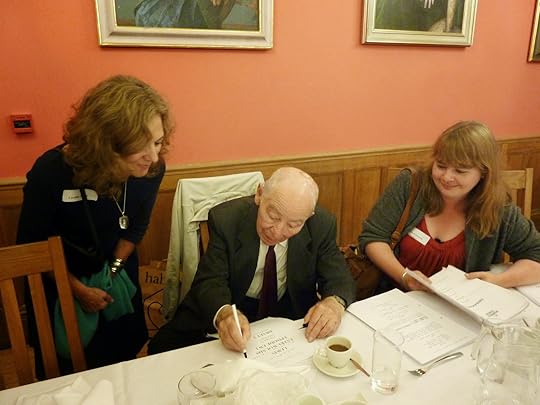
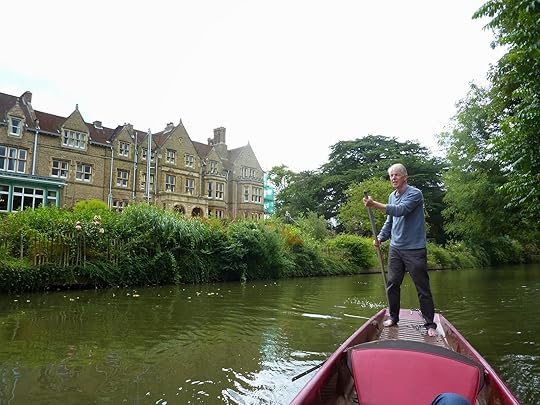
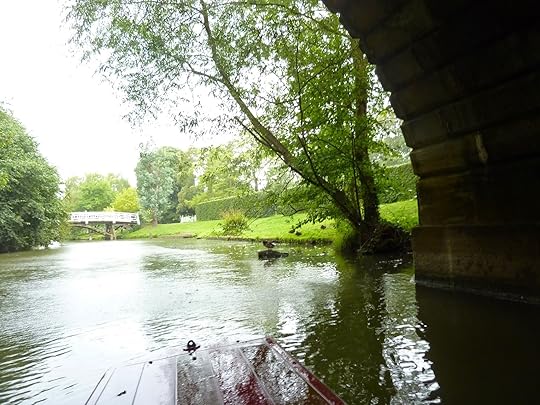
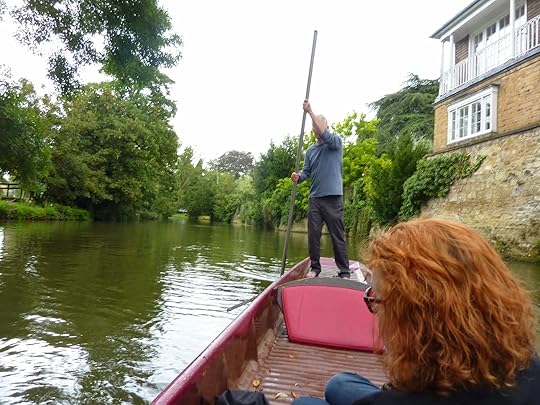
The 21st annual Crime and Mystery Week-end at St Hilda's College in Oxford was as enjoyable as ever. The theme, topically, was detective fiction and warfare, and this inspired a wide variety of interesting and informative papers from speakers ranging from Val McDermid, and Jake Kerridge of the Daily Telegraph, to Anne Perry and the conference guest of honour, Peter Robinson. My own contribution focused on the 'Golden Age and the Shadows of War', and I was truly gratified by response to news about the forthcoming publication of The Golden Age of Murder. Champagne was kindly provided by a good friend, and consumed with great appreciation, especially on my part!
The after dinner speakers on Friday and Saturday were, respectively, the legendary Colin Dexter (who mentioned, among many other things, his enthusiasm for John Dickson Carr),, and Keith Miles, better known to some readers as Edward Marston, author of the Railway Detective series. At the top table on Friday evening it was rather wonderful to be in the company of the likes of Colin, Anne, Andrew Taylor, Imogen Robertson, and Alan Bradley, a highly successful author whom I've never met before. Alan is Canadian, but after a spell in Malta, he now lives at Peel on the Isle of Man, an entrancing resort in which I once set a short story, 'Sunset City'.
A week-end like this gives you the chance to make new friends, and also to get to know some people better whom you may have met only fleetingly in the past. The setting gives this event a special character and atmosphere, and I encourage anyone who is interested in in-depth discussion of the genre, coupled with a great deal of conviviality, to consider attending in the future. Great credit is due to the tireless organisers, Eileen Roberts and Kate Charles. The talks themselves are chaired by N.J. Cooper (also know as Natasha Cooper and Daphne Wright), and I can only say that I've attended many different kinds of events in various sectors, but rarely encountered any chair as accomplished. It's a challenging role, because a great deal of concentration is required to do it well, but she makes it all look effortless, and her unfailing generosity makes the task of the speakers so much easier. And that's invaluable, because the audience is very knowledgeable, and all the speakers are naturally anxious to make sure that their talks live up to the standards expected.
I was delighted to share the platform with Ruth Dudley Edwards, who read and commented most helpfully on an early draft of The Golden Age of Murder, and her talk about Northern Ireland and terrorism was spell-binding. On the Sunday morning, Ruth and I went punting with Andrew Taylor (whose brand new book I'm longing to read after hearing him speak about it). Now, I've not been in a punt since I was a student a long, long time ago, but thanks to Andrew's expert steering with the punt pole we managed to avoid the calamity of capsizing that would definitely have ensued had I been left to my own devices. A fun memory of a great week-end.
Published on August 18, 2014 04:17
August 14, 2014
Forgotten Book - Corpse in Cold Storage
Before I get stuck into today's Golden Oldie, may I say how gratified I am by the reaction to news of the forthcoming publication of The Golden Age of Murder? I'm sure those who have read my articles and blog posts about the Golden Age will realise that writing the book has been a labour of love. Even late last night, I was tinkering with some of the notes and the bibliography (to be honest, 'tinkering' is a euphemism for 'expanding'...). One of the beauties of today's world of global communication is that people have made me aware that the book is already being marketed via Amazon here and in the US, and there have even been some pre-orders. Wow, talk about quick off the mark!
One of the reasons why I was keen for the news to come out now, even though the official publication date for both the UK edition and the US edition is next May is that this week-end, I'm giving a talk about the Golden Age and the Shadows of War at the St Hilda's Crime and Mystery Conference, and I really didn't feel I could resist keeping the news to myself any longer. There's a strong contingent of Golden Age fans at St Hilda's, and I've been looking forward to this event for months.
Now, back to today's Forgotten Book. Corpse in Cold Storage, written by Milward Kennedy, and published in 1934, is my choice. It's certainly forgotten - I can't recall reading any discussion of it anywhere. It's probably fair to say that Kennedy's fan club is a pretty small and exclusive group. Possibly I'm the only current member, though I hope not. His books often frustrate me, because they frequenly fail to live up to their potential, but they usually offer something "different" and rather inventive that is uncommon and appealing.
Corpse in Cold Storage is a case in point. The title comes from a phrase that Kennedy had used in an earlier novel, and which (I guess) gave him a starting point for this story. The corpse belongs to an unpleasant man called Charleson, and it is found in...an ice cream van. Perhaps unsurprisingly, this points to a "time of death" mystery that is quite cleverly concocted. The setting, in a small and run-down south coast resort delightfully called Heartsease, is also very nicely done. The victim, and almost all of the suspects are not, however, very interesting. What's unusual about this book is the detective duo who take an interest in the case.
Kennedy had previously tried and abandoned a series police detective (by the name of Cornford) after only two books. This story sees the return of Sir George Bull and his wife Mary after they first appeared in Bull's Eye, a book which left me underwhelmed. Corpse in Cold Storage is better, and shows the Bulls in good form. Sir George is a hard-drinking conman, and he wants to find out who killed Charleson simply in order to blackmail the killer. His seductive wife aids and abets him, whilst trying to persuade him to moderate his intake of alcohol, and she proves a much better detective. Together they make an entertainingly different pair of sleuths. There have been villainous detectives before and since the Bulls, but nobody quite like them.
I enjoyed the story a good deal, though some of the detail about alibis, whilst in the Golden Age tradition, left me as cold as Charleson's corpse. It's a shame that Kennedy abandoned the Bulls after this book. He strikes me as a restless writer, constantly trying something different, and never quite writing a masterpiece. One final point: my American edition describes him as "President of the Detection Society of England". He was never the Detection Club's President, though, and I bet he got into trouble over that with the Club's founder, Anthony Berkeley, who was perhaps the prickliest of all Golden Age writers. There will be more about both Kennedy and Berkeley in The Golden Age of Murder.
One of the reasons why I was keen for the news to come out now, even though the official publication date for both the UK edition and the US edition is next May is that this week-end, I'm giving a talk about the Golden Age and the Shadows of War at the St Hilda's Crime and Mystery Conference, and I really didn't feel I could resist keeping the news to myself any longer. There's a strong contingent of Golden Age fans at St Hilda's, and I've been looking forward to this event for months.
Now, back to today's Forgotten Book. Corpse in Cold Storage, written by Milward Kennedy, and published in 1934, is my choice. It's certainly forgotten - I can't recall reading any discussion of it anywhere. It's probably fair to say that Kennedy's fan club is a pretty small and exclusive group. Possibly I'm the only current member, though I hope not. His books often frustrate me, because they frequenly fail to live up to their potential, but they usually offer something "different" and rather inventive that is uncommon and appealing.
Corpse in Cold Storage is a case in point. The title comes from a phrase that Kennedy had used in an earlier novel, and which (I guess) gave him a starting point for this story. The corpse belongs to an unpleasant man called Charleson, and it is found in...an ice cream van. Perhaps unsurprisingly, this points to a "time of death" mystery that is quite cleverly concocted. The setting, in a small and run-down south coast resort delightfully called Heartsease, is also very nicely done. The victim, and almost all of the suspects are not, however, very interesting. What's unusual about this book is the detective duo who take an interest in the case.
Kennedy had previously tried and abandoned a series police detective (by the name of Cornford) after only two books. This story sees the return of Sir George Bull and his wife Mary after they first appeared in Bull's Eye, a book which left me underwhelmed. Corpse in Cold Storage is better, and shows the Bulls in good form. Sir George is a hard-drinking conman, and he wants to find out who killed Charleson simply in order to blackmail the killer. His seductive wife aids and abets him, whilst trying to persuade him to moderate his intake of alcohol, and she proves a much better detective. Together they make an entertainingly different pair of sleuths. There have been villainous detectives before and since the Bulls, but nobody quite like them.
I enjoyed the story a good deal, though some of the detail about alibis, whilst in the Golden Age tradition, left me as cold as Charleson's corpse. It's a shame that Kennedy abandoned the Bulls after this book. He strikes me as a restless writer, constantly trying something different, and never quite writing a masterpiece. One final point: my American edition describes him as "President of the Detection Society of England". He was never the Detection Club's President, though, and I bet he got into trouble over that with the Club's founder, Anthony Berkeley, who was perhaps the prickliest of all Golden Age writers. There will be more about both Kennedy and Berkeley in The Golden Age of Murder.
Published on August 14, 2014 22:00



